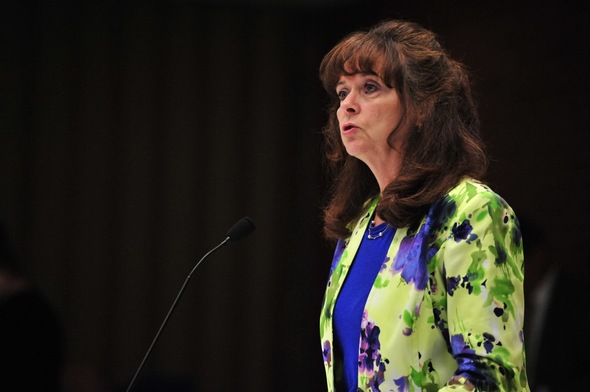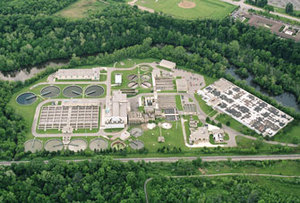Ann Arbor City Council gives initial approval to utility rate increases, budgets for wastewater upgrades

Sue McCormick, the city's public services administrator, gives a report to the City Council Monday night about the city's utility rate increases.
Ryan J. Stanton | AnnArbor.com
The new rates, which would take effect July 1, are expected to provide revenue increases of 3.36 percent in water, 4 percent in sewer and 3.35 percent in stormwater. The council will consider giving final approval to the increases at its June 20 meeting.
In terms of dollars, the changes are projected to increase revenues in water, sewer and stormwater by $664,993, $829,481 and $176,915, respectively. City officials say the increases are needed in order to finance capital improvements in all three systems.
According to data provided by the city, the impact on a typical residential customer is $18.92 per year, a net increase of 3.2 percent.
The typical residential customer pays close to $600 a year.
Mayor John Hieftje defended the increases at Monday's council meeting, saying they're "pretty close to inflationary" and less than increases proposed in many other communities.
"We're certainly, it sounds like, on the very low end," Hieftje said.
Sue McCormick, the city's public services administrator, backed up that claim with a report on what other communities in the state are doing with utility rates.
"We looked at a variety of sources, including some online sources and some information in the Associated Press," she said, noting that Plymouth is looking at a 40 percent increase in rates; Farmington, 15 percent; Detroit, 9.3 percent, and Canton, 7 percent.
She said the average increase for Southeast Michigan is 9 percent on a typical residential bill — nearly three times the level of increase being proposed in Ann Arbor.
Council Member Stephen Kunselman, D-3rd Ward, noted those municipalities are part of the Detroit Water and Sewerage Department. He asked McCormick if there was information available on other communities like Lansing and Grand Rapids.
McCormick said she'd try to dig up more information and present that to council members before the June 20 meeting.
The council also took action Monday night to approve a $2.4 million contract amendment with environmental consultant Malcolm Pirnie Inc. for engineering design services and bid work on the city's Wastewater Treatment Plant facilities renovation project.
The city is following through with renovations identified in the Wastewater Treatment Plant's Facilities Master Plan, a 25-year planning document. Construction of the project will take place over five fiscal years and is estimated to cost $80 million.

The city's Wastewater Treatment Plant at 49 South Dixboro Road.
Photo courtesy of city of Ann Arbor
In addition to the complete demolition and replacement of the west portion, the project includes other renovations and improvements throughout the plant. Malcolm Pirnie Inc. is producing final bid drawings and specifications for securing permits and soliciting bids from contractors.
In March 2005, the City Council approved an original $3 million contract with Malcolm Pirnie Inc. for various services related to the project. That's been amended four times now.
The latest amendment involves completing the design, securing the necessary regulatory permits and applying to the Michigan Department of Environmental Quality for low-interest loans from its 2012 State Revolving Fund Program. Including the latest amendment to the contract, the total cost for design engineering services is $8.8 million.
Ryan J. Stanton covers government and politics for AnnArbor.com. Reach him at ryanstanton@annarbor.com or 734-623-2529. You also can follow him on Twitter or subscribe to AnnArbor.com's e-mail newsletters.


Comments
snapshot
Wed, Jun 8, 2011 : 6:35 p.m.
Mayor Hiefjie fails to note that inflation is ZERO when you back out food and gas price increases as the Feds do when calculating GDP. Then we have Sue McCormick using Detroit's corruption riddled and bankrupt water district as a basis for comparison in necessary rate increases. Maybe that's a legitimate comparison Sue. These folks continue to justify tax increases to perform infrastructure improvements when they've been remiss in using the dollars they've already collected for increased compensation plans, pet projects, and greenbelts, golf courses, and DDA projects. Now that they've allowed everything related to "infrastructure" to fall apart they get to hold us financially hostage to pay for their past mismanagement. Maybe Ann Arbor should be compared to the past and present corrupt and incompetant management of Detroit. Increased property assessments, increases in parking, increases water,sewer, and storm drainage, increases electric and gas, increases, increases, increases. How about increasing pension and health contributions for government employees and their work hours with no additional pay while you officials are in the increasing mood.
JSA
Wed, Jun 8, 2011 : 3:04 p.m.
What I don't understand is how the city can spend a million dollars on a fountain, thousands of dollars for consultants that are not needed unless the staff is not qualified for the jobs they hold, hundreds of thousands of dollars trying to push the AATA that has no potential for funding and that very few people want. Maybe they need some increase but how can you tell when city council is so irresponsible in its fiscal policy?
Stephen Landes
Wed, Jun 8, 2011 : 2:58 p.m.
@Ryanstanton In a recent A2.com article there was information about the amount of money tied up in the water fund -- seems to me like $25 million. If we have accumulated that much unspent money for water projects with current water/sewer rates doesn't it call into question the need for increased water/sewer rates? I can ask my Ward 2 council members, but maybe it would pack more punch if you asked for the record? Thanks.
kludwig
Wed, Jun 8, 2011 : 1:13 p.m.
If history is any guide ) the new increases will have buried in them a big increase in fees paid internally to the general fund for "administration services" or some other label. Water and sewer rates have been a vehicle for back door tax increases for many decades in this city ( I've been watching since the 70's). Utilities directors maintain their power, independence and perks by submitting to these internal charges so that Administration and Council do not have to go to voters for tax or bond requests. The brochures for the Neptune Water Meter Company used to, and still may, quote a Roman aqueduct overseer, " He who controls the water, controls the world."
Brad
Wed, Jun 8, 2011 : 12:45 p.m.
While the percentage increase relative to other communities is somewhat helpful, what would be far better is the relative water bills at similar usage levels. Are we on the "low end" of that? I doubt it.
a2grateful
Wed, Jun 8, 2011 : 11:49 a.m.
"Pretty close to inflationary. . ." "Less than increases proposed in many other communities. . ." "We're certainly, it sounds like, on the very low end," Hieftje said. 1) Inflationary increases keep a2 at the top of the list of highest taxation per resident. 2) Capital projects like wastewater treatment are typically funded through bond issuance, spreading repayment over long time periods. It is atypical that a project of this magnitude would be paid in the front-loaded manner that the city is undertaking. That is, unless they no longer have capability to pay bond issuance due their current overextension in that area, such as underground parking for Hieftje Hotel and Conference Center, or other construction projects.